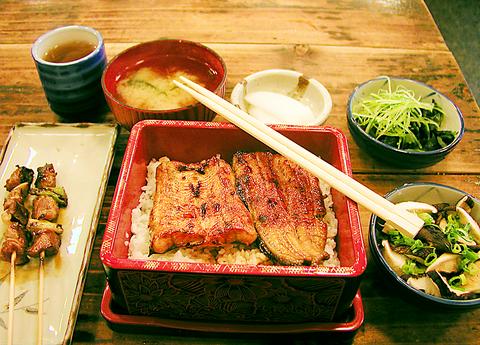The neighborhood around Tienchin Street between Changan Road and Nanking Road is chock full of Japanese restaurants that are visible reminders that this area was previously home to much of the Japanese colonial administration. Now the narrow alleys are a favorite haunt of Japanese businessmen and tourists, as well as hip young Taiwanese.
Fei Qian Wu is not the oldest restaurant in the neighborhood, but it is easily the busiest, due mainly to its low prices and delicious roasted eel. As soon as its doors open crowds begin to converge so that about 20 minutes into its business hours there is already a line out the door and down the alley. With this kind of meal-time crunch, space is at a premium and it's common to share a table with strangers.
The cafeteria feel of the restaurant's seating arrangement extends to its service as well. A small legion of servers scurries about filling orders while others clear tables using clackety pushcarts. Food arrives at the table in no longer than five minutes from the time of ordering.

PHOTO: MAX WOODWORTH, TAIPEI TIMES
Despite the clear emphasis on turning high numbers of tables, not many shortcuts appear to be taken in the kitchen.
Most diners will make a special trip to Fei Chien Wu to eat its roasted eel, which is several cuts above the usual fare at similarly priced Japanese restaurants. A single portion of eel on rice with miso soup costs NT$140, while a double portion comes in at NT$240.
The double portion of eel would be plenty for one person, but it is well worth it to flesh out a meal with some of the smaller dishes on offer. Try the grilled squid, which is sufficient for up to four people or the shrimp and vegetable tempura. The best value must be the chicken kebabs, which cost only NT$20 a piece. The grilled and marinated mushrooms and seaweed are also refreshing choices for summer that cost NT$40 each.
This restaurant does not score high marks in the atmosphere category, but then it's the food and not the ambiance that has kept the store running for over 20 years. First-time visitors to Fei Chien Wu need not be dismayed if there is a line outside the restaurant. The owners see to it that the line moves quickly and the food will make the wait worthwhile.

On April 26, The Lancet published a letter from two doctors at Taichung-based China Medical University Hospital (CMUH) warning that “Taiwan’s Health Care System is on the Brink of Collapse.” The authors said that “Years of policy inaction and mismanagement of resources have led to the National Health Insurance system operating under unsustainable conditions.” The pushback was immediate. Errors in the paper were quickly identified and publicized, to discredit the authors (the hospital apologized). CNA reported that CMUH said the letter described Taiwan in 2021 as having 62 nurses per 10,000 people, when the correct number was 78 nurses per 10,000

As we live longer, our risk of cognitive impairment is increasing. How can we delay the onset of symptoms? Do we have to give up every indulgence or can small changes make a difference? We asked neurologists for tips on how to keep our brains healthy for life. TAKE CARE OF YOUR HEALTH “All of the sensible things that apply to bodily health apply to brain health,” says Suzanne O’Sullivan, a consultant in neurology at the National Hospital for Neurology and Neurosurgery in London, and the author of The Age of Diagnosis. “When you’re 20, you can get away with absolute

May 5 to May 11 What started out as friction between Taiwanese students at Taichung First High School and a Japanese head cook escalated dramatically over the first two weeks of May 1927. It began on April 30 when the cook’s wife knew that lotus starch used in that night’s dinner had rat feces in it, but failed to inform staff until the meal was already prepared. The students believed that her silence was intentional, and filed a complaint. The school’s Japanese administrators sided with the cook’s family, dismissing the students as troublemakers and clamping down on their freedoms — with

As Donald Trump’s executive order in March led to the shuttering of Voice of America (VOA) — the global broadcaster whose roots date back to the fight against Nazi propaganda — he quickly attracted support from figures not used to aligning themselves with any US administration. Trump had ordered the US Agency for Global Media, the federal agency that funds VOA and other groups promoting independent journalism overseas, to be “eliminated to the maximum extent consistent with applicable law.” The decision suddenly halted programming in 49 languages to more than 425 million people. In Moscow, Margarita Simonyan, the hardline editor-in-chief of the